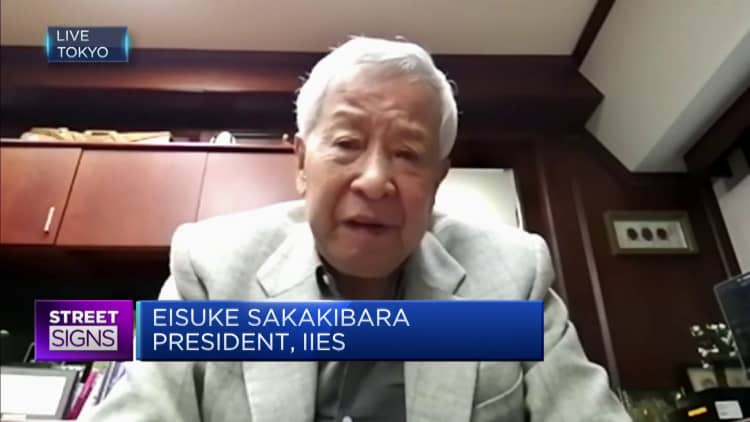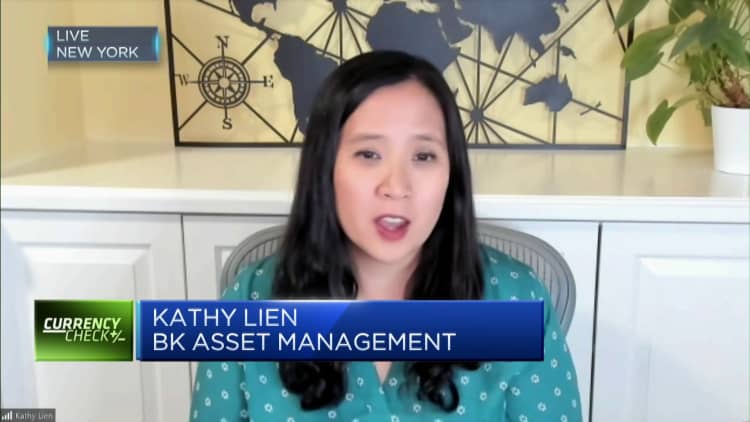The Japanese currency could weaken even further to 170 levels against the U.S. dollar next year, according to Japan's former vice minister of finance for international affairs, Eisuke Sakakibara.
Sakakibara, known as "Mr. Yen" for his efforts to influence the currency's exchange rate through verbal and official intervention in the late 1990s, said he expects the currency to depreciate further as it hovers near its weakest levels in 32 years.
Commenting on reports of yet another intervention being conducted by officials late last week, Sakakibara said, "Most of the business people are now expecting further depreciation of the yen. 170 is well in the scope," speaking on CNBC's "Street Signs Asia."
Japanese officials last publicly confirmed to have taken direct action to defend the currency in September, when they reportedly spent a record 2.8 trillion yen ($19.7 billion) to stem the yen's sharp declines, according to Reuters. The currency resumed further weakening to breach a key psychological level of 150 within a month.
Sakakibara's forecast for the yen comes as Japanese officials remain tight-lipped on publicly confirming a second intervention taking place to defend the currency.
Loading chart...
A sharp strengthening of the yen to around 146 against the greenback followed media reports of such action taking place, citing people familiar with the matter — after the yen breached the 150 level against the U.S. dollar last week, its weakest since August 1990.
If confirmed, it would be the second such intervention after officials confirmed to have taken action to defend the currency in late September, as the yen breached levels around 145 against the U.S. dollar.
Dovish stance for now
Finance Minister Shunichi Suzuki was quoted as saying Tuesday that the central bank easing its monetary policy and a foreign exchange intervention were not contradictory.
"Monetary easing aimed at sustainable and stable price hikes including wage growth, and currency intervention in response to excessive market moves, are different in terms of policy objectives," Reuters reported Suzuki as saying.

A majority of economists polled by Reuters expected no change to the nation's dovish monetary policy in its next meeting slated for Thursday.
Twenty-five of 28 polled economists said the Bank of Japan will likely maintain its current stance until the second half of 2023.
A policy shift in 2023?
Sakakibara added that he expects the Bank of Japan to start raising interest rates under continued inflationary pressures "some time later next year" — once central bank governor Haruhiko Kuroda's term expires in April 2023.
"After the Bank of Japan's government changes, if the Japanese economy is overheated, then there may be a change in their monetary policy from easing to tightening," he said. "I expect tightening to happen late next year," adding that such a policy shift could come in the form of one or two rate hikes.
"Depends on the condition of the economy next year, as expected, if there is overheating of the economy, which is quite possible, then Bank of Japan will probably raise interest rates," he said.
'A history of failed interventions'
Even if authorities continue to intervene to defend its currency, it won't have much of an effect, Sakakibara said.
"I think authorities know that intervention itself is not that effective," he said.
Japanese authorities are not in denial of the limited impact of direct foreign exchange intervention, according to BK Asset Management.
"The Bank of Japan and the Ministry of Finance have a history of failed interventions — we know it, they know it," the firm's managing director of FX strategy Kathy Lien said, shortly after the yen breached 150 against the U.S. dollar and before media outlets reported a second intervention took place.
"The only time the intervention efforts truly worked was when it was joint interventions with other G-7 nations," Lien said.
Pointing to the Bank of Japan's monetary policy meeting scheduled for next week, Lien said a rate hike would be more effective in defending the yen.
"What they really need to do is raise interest rates," she said. "Between the weakness of the yen and the rise of bond yields, it's really testing that quarter-percent 10-year yields cap."
"They're running out of options at this point," said Lien. Policymakers have ruled out such a move to support the currency.


